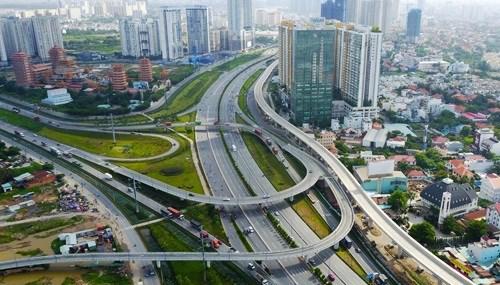Vietnam disbursed an estimated 115,906.9 billion VND ($4.9 billion) in public investment in the first four months of 2024, a rate slightly higher than a year earlier but still below government targets.
The slow capital disbursement hinders the construction of critical infrastructure, delaying the progress of essential public projects.
According to the Ministry of Finance, the disbursement rate reached 16.41% of the official plan for the year and 17.46% of the target set by the Prime Minister.
Obstacles and Delays
Several factors continue to hinder the timely disbursement of public investment funds. These include delays in land clearance for major national highway projects, including sections of the North-South Expressway.
The Ministry of Transport reports that site clearance and relocation of technical infrastructure, like high-voltage power lines, are moving slower than expected.
The construction of several large transportation projects in the Mekong Delta region has led to a scarcity of backfill materials like stone and sand. In contrast, government mechanisms to streamline the exploitation of construction materials still face obstacles.
Further, lingering problems with policy mechanisms, fluctuations in raw material prices, and disagreements among landowners over compensation values continue to drag down disbursement rates.
Recommendations for Improvement
The Ministry of Finance has urged the Ministry of Transport and local governments to implement more decisive measures to accelerate the disbursement of public investment capital. Authorities are focusing on resolving land clearance issues by prioritizing the construction of resettlement areas.
The ministry has also asked localities to secure adequate sources of construction materials and coordinate with construction contractors to complete all procedures for the development of dedicated quarries.
To address bottlenecks arising from national target programs, the Ministry of Finance is coordinating with the Ministry of Planning and Investment and other central agencies to draft proposals to the National Assembly. These proposals aim to provide a special mechanism for removing obstacles and speeding up national target programs for the 2021-2025 period.
The Need to Expedite Investment
Vietnam remains heavily reliant on public investment to fuel economic growth, with the government focusing significant resources on developing the country’s infrastructure network.
The slow progress in disbursing investment capital raises concerns about the country’s ability to maintain momentum in modernizing its infrastructure and improving overall competitiveness. If the current trend continues, projects risk delays, cost overruns, and a negative impact on planned economic development.
The government has implemented various measures to expedite disbursement in recent years. Still, persistent challenges highlight the need for further streamlining of administrative procedures, a more decisive approach to addressing resettlement and compensation issues, and improved coordination among different government agencies throughout the project development and implementation phases.









 Google translate
Google translate